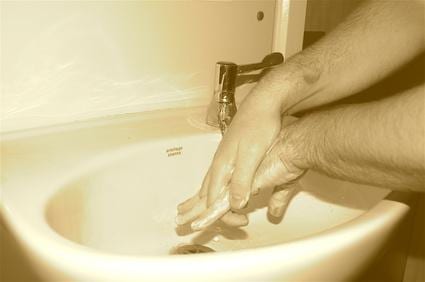It’s easy to remember to wash your hands when your hands are full of sticky molasses or dirt. It’s a lot harder to remember when the filth is invisible. It’s easy to wipe down your hands and move on. Meanwhile, germs can settle in and make themselves at home in your mouth, eyes and eventually your body. IF you can remember how critical hand washing is to your immune system, you will get to it a lot more often–whether you can see the grime or not.
Why
Germs run around your body, especially when you are sick. The mucous and moisture in your nose, mouth and respiratory system work hard to trap those germs and get them out of your body. The ones that come out through breathing, sneezing, coughing and other expulsion can cover your hands and other objects around you. These combine with germs from raw meat, the dirt outside and other grime. If you let germs stay on your hands, you run the risk of letting them in through your nose, mouth, eyes, abrasions and other openings on your body.
How
It’s important to thoroughly and properly wash your hands to remove as many of the germs as possible. Run the warmest water you can handle, then cover your hands with a lather of soap and rub them for at least 20 seconds. Don’t forget all the little crevices around your nails and between your fingers. Don’t stop washing at your wrists; move up your arms a bit. Rinse it all away and dry your hands with a towel.
How Often
Wash your hands after you are exposed to germs and before you expose your hands to open parts of your body. Wash your hands after you touch anything potentially disease-ridden, such as animal products, waste products, human fluids and dirt. If you or those around you are sick, increase your hand-washing routine, especially after sneezes and coughs. Wash your hands, even if you think they are clean, before eating, touching cuts or your eye or any other exposed part of you or others.
Out and About
It can be easy to neglect a washing routine when you are outside the home. Excuse yourself to the bathroom to wash your hands before a meal and always wash after using public bathrooms. Grab some paper towels to avoid touching anything in the bathroom. Keep antibacterial gel in your purse for moments when water or soap are not available.
Pass It On
Teach these habits to your children. Let them see you washing often. Lean over them as they learn and show them how to scrub their hands and get lathered. Sing a favorite song that lasts about 20 seconds each time you scrub down. Post notes at your children’s eye level that remind them to wash, and keep a stool close to any sinks to help those who aren’t tall enough to reach the faucet on their own.
Photo Credit
- washing hands image by JASON WINTER from Fotolia.com





